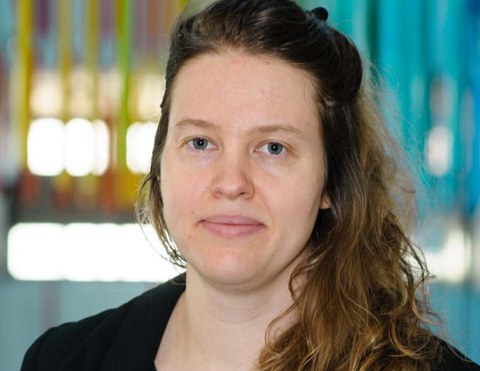06.09.2024
Erfolgreich in Europa: TUD - Chemikerin Dr. Dorothea Golze erhält ERC Starting
Dr. Dorothea Golze, Nachwuchsgruppenleiterin an der Professur für Theoretische Chemie der Technischen Universität Dresden, setzte sich im Wettbewerb um europäische Forschungsförderung durch und wurde mit einem ERC Starting Grant über 1,49 Mio Euro ausgezeichnet. Der renommierte Preis ermöglicht es der Chemikerin, in den nächsten fünf Jahren ihre Forschung zu lichtinduzierten Prozessen an Materialgrenzflächen auszubauen und ihre sechsköpfige Forschungsgruppe voranzubringen.
Materialgrenzflächen: Laser, Photovoltaik, Quantenkommuniaktion
Im Rahmen ihres Projekts „Accurate simulations of photochemical and photophysical processes at materials interfaces (PhotoMat)“ untersucht Dr. Golze die Dynamik von photoinduzierten Reaktionen an Materialgrenzflächen. Diese Prozesse befassen sich damit, wie Grenzflächen auf Lichteinwirkung (Photonen) reagieren. Hochintensive Lichtenergie – etwa von einem Laser – verändert Materialien auf vielfältige Weise. Die Absorption von Licht kann zum Beispiel photochemische Reaktionen auf einer Oberfläche auslösen. Durch den Einsatz fortschrittlicher Computersimulationen möchte Golze das Verhalten an Grenzflächen besser verstehen, um neue photonische Geräte mit vielseitigen Funktionen zu entwickeln.
„Experimentelle Techniken stoßen oft an ihre Grenzen, wenn es darum geht, die zugrundeliegenden Mechanismen dieser Reaktionen vollständig zu erfassen. Mit Simulationen können wir diese Lücken schließen und detaillierte Erkenntnisse gewinnen, die das Forschungsfeld entscheidend voranbringen“, erklärt Dr. Golze. Ihr Projekt wird sich auf die Entwicklung neuer Berechnungsmethoden konzentrieren, die speziell auf die Untersuchung der Dynamik angeregter Zustände von Materialien abzielen. Diese Methoden sollen in Softwarepakete integriert werden, die Rechnungen auf den weltweit leistungsfähigsten Supercomputern ermöglichen.
Von der Grundlagenforschung zur Anwendung
Golzes Forschung bietet potenzielle Anknüpfungspunkte für eine Vielzahl von Anwendungen, insbesondere in der Photochemie und Photophysik. Ein Beispiel sind photoschaltbare Moleküle, die in Kombination mit 2D-Materialien das Potenzial haben, die Eigenschaften von Bauelementen durch Licht gezielt zu steuern. Weitere Anwendungen könnten in der Quantenkommunikationstechnologie zu finden sein, bei der Materialien mit langlebigen Exitonen eine vielversprechende Rolle spielen.
„Der ERC Starting Grant gibt mir die Möglichkeit, neue Forschungsrichtungen zu erkunden und meine Arbeitsgruppe weiter auszubauen“, sagt Golze, die seit Juni 2021 ihre Nachwuchsgruppe im Rahmen des Emmy Noether-Programms der Deutschen Forschungsgemeinschaft leitet.
Nach ihrem Chemiestudium an der Universität Leipzig promovierte Golze an der Universität Zürich (Schweiz) bis 2016. Als Postdoc wechselte sie an die Aalto Universität (Finnland) in die Gruppe von Prof. Patrick Rinke. Anschließend nahm Dr. Golze an der TU Dresden ihre eigene Gruppenleitung auf.
Über den ERC
Der ERC, der 2007 von der Europäischen Union gegründet wurde, ist die wichtigste europäische Förderorganisation für exzellente Pionierforschung. Er fördert kreative Forscher aller Nationalitäten und jeden Alters, die Projekte in ganz Europa durchführen. Der ERC bietet vier zentrale Förderprogramme an: Starting Grants, Consolidator Grants, Advanced Grants und Synergy Grants. Mit seinem zusätzlichen Programm für Proof of Concept Grants hilft der ERC den Geförderten, die Lücke zwischen ihrer Forschung und den frühen Phasen ihrer Kommerzialisierung zu schließen. Der ERC wird von einem unabhängigen Leitungsgremium, dem wissenschaftlichen Rat, geleitet. Das Gesamtbudget des ERC für den Zeitraum 2021 bis 2027 beläuft sich auf mehr als 16 Milliarden Euro und ist Teil des Programms Horizon Europe.
Kontakt:
Pressestelle TU Dresden
Tel.: +49 351 463-32398
Dr. Dorothea Golze
Theoretische Chemie ‚
TU Dresden
Tel. 0 351 463 40844
Email:

